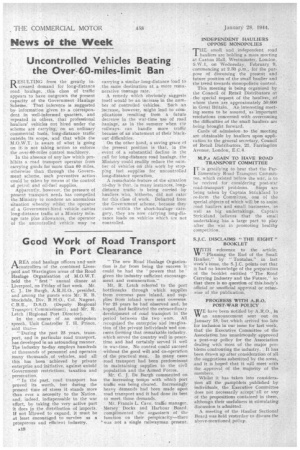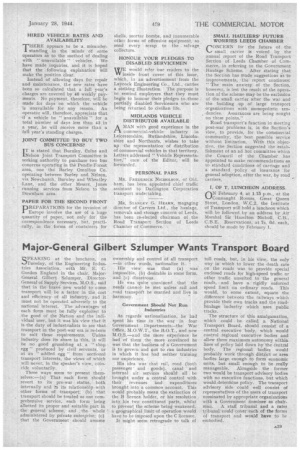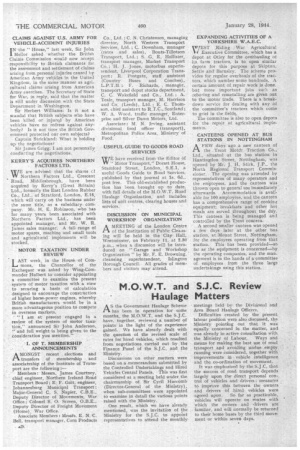News Of the Week Uncontrolled Vehicles Beating the Over-60-miles-limit Ban
Page 20

Page 21

Page 22

If you've noticed an error in this article please click here to report it so we can fix it.
RESULTING from the greatly in. creaseddemand for long-distance road haulage, ,this class of traffic appears to have outgrown the present capacity of the Government flaular‘e Scheme. That inference is suggested by information 'given to a correspondent in well-informed . quarWs, and repeated in others, that professional hauliers' vehicles not hired under the scheme are carrying, on an ordinary commercial basis, Tong-distance traffic outside_ its scope, and that while the M.0.1,V.T. is. aware of what is going on it. is not taking action to enforce the over-60-miles control machinery.
In the absence of any law which prohibits a road transport operator from carrying goods for more than 60 Miles, otherwise than through the Government scheme, such preventive action could be talen by means of the control of petrol and oil-foci supplies.
• Apparently, however, the pressure of present transport needs has compelled • the Ministry to condone an anomalous situation whereby whilst the operator of a Government-hired vehicle carries long-distance traffic at a Ministry mileage rate plus alloWances, the operator • of the uncontrolled vehicle may be carrying a similar long-distance load to :the same destination at a more remu nerative tonnage rate. • A remedy which obviously' suggests itself would be an increase in the num ber . of controlled vehicles. Such an increase, however, might lead to complications resulting from a future decrease, in the war-time use of road haulage, as in the summer when the railways, can handle more traffic because of an abatement of their black out difficulties.
On the other hand, a saving grace of the present position is that, in the event of a substantial decline in the call for long-distance road haulage, the Ministry could readily reduce the number Of vehicles on this work by stopping fuel supplies for uncontrolled long-distance operation.
. A remarkable feature of the situation tO-day is that in many instances, longdistance traffic is being carried by hauliers, who, hitherto; did not cater for this class of work. Debarred from the Government scheme, because they came within the short-haulage category, they are now carrying long-dis. tance loads on vehicles which. are not controlled.
INDEPENDENT HAULIERS OPPOSE MONOPOLIES
THE small and independent road hauliers are holding a mass meeting at Caxton Hall, Westminster, London, S.W.1, on Wednesday, February 9, commencing at 2.30 p.m., for the purpose of discussing the present and future position of the small haulier and the trend towards monopolistic control.
This meeting is being organized by the Council Of Retail Distributors at the special request of the hauliers, of whom there are approximately 50,000 in Great Britain, An interesting meeting seems to be assured, as important resolutions concerned with overcoming the difficulties .of the small hauliers are being brought forward.
Cards admission , to the' meeting are obtainable by hauliers upon application to the general secretary. Council of Retail Distributors, 23, Farringdon Avenue, London, E.C.4.
M.P.s AGAIN TO HAVE ROAD TRANSPORT COMMITTEE TT is gratifying to hear that the Par liamentary Road Transport Committee, which existed before the war, is to be revived for considering post-War road-transport problems. Steps are being taken by Captain Strickland to re-form the Committee, one of the special objects of which will be to assist road hauliers and small businesses, as well as big undertakings. Captain Strickland, believes that the small undertaking has a large part to play . -after the war in promoting healthy competition.
S,J.C. DISCLAIMS "THE EIGHT" BOOKLET
WITH reference to the article; " Planning the End of the Small Haulier," by " Tantalus," in last week's issue, the S.J.C, points out that it had no knowledge of the preparation of the booklet entitled " The Road Carrying Industry and the Future," so that there is no question of this body's official or unofficial approval Or otherwise of the pliblication_ PROGRESS WITH A.R.O. " POST.WAR POLICY WE -have been notified by A.R.O., in an announcement sent out On Jannary 18, but which arrived too late for inclusion in our issue for last Week, thatthe Executive Committee of the Association has unanimously' approved a post-war policy for the Association dealing with most -of the major problems confronting the industry. It has been drawn up after consideration of all the suggestions:submitted by the areas, and it is hoped that it will meet with the approval of the majority of the members.
Whilst it has taken into consideration all the pamphlets published by individuals, the Executive Committee does not necessarily accept' all or any of the propositions contained in them, although their usefulness in stimulating 'discussion is admitted.
A meeting of the:Haulier, Sectional Board was held yesterday to discuss the above-mentioned. policy.
HIRED VEHICLE RATES AND AVAILABILITY
T'ERE appears to be a misunderstanding in the minds of some operators as to the method of dealing
with " unavailable " " vehicles. We have made inquiries, and it is hoped that the following explanation will make the position clear. _
Instead of allowing days for repair and maintenance, the new rates have been so calculated that a full year's charges are covered by 46 weekly payments. No payment, therefore., will be made for days on which the vehicle is unavailable for any reason. An operator will, therefore, appreciate that if a vehicle be " unavailable " for a total number of days less than 43 in a year, he will receive more than a full year's standing charges.
JOINT COMMITTEE TO BUY TWO BUS CONCERNS?
I T is stated that Burnley, eolne and Nelson Joint Transport Committee is seeking authority to purchase two bus concerns operating in the PendleForest area, one the Barley Omnibus Co. operating between Barley and Nelson, via Newchurch, Burnley and Wheatley Lane, and the other Messrs'. Jones running services from Nelson to the Downham area. • • PAPER FOR THE SECOND FRONT
PREPARATIONS for the invasion of Europe involve the use of a huge quantity of paper, not only for the correspondence necessary, but, practically, in the forms of containers for shells, mortar bombs, and innumerable other forms of offensive equipment, so send every scrap to the salvage. collectors.
HONOUR YOUR PLEDGES TO DISABLED SERVICEMEN
WE would refer our readers to the inside front cover of this issue, which, in an advertisement from the Laycock Engineering Co., Ltd., carries a striking illustration. The purpose is to remind employers that they must begin to honour their pledges to-those partially disabled Servicemen who are being returned to civilian life.
MIDLANDS VEHICLE DISTRIBUTOR AVAILABLE
AMAN with good experience in the commercial-vehicle industry in Leicestershire, Rutlandshire, Lincolnshire and Northants, wishes to take up the representation of distribution of commercial vehicles in that territory. Letters addressed " Vehicle Representative," care of the Editor, will be forwarded.
PERSONAL PARS
MR. FREDERICK NICHOLSON, Of Oldham, has been appointed chief traffic assistant to Darlington Corporation transport undertaking.
MR. STANLEY G. HEARN, magaging director of Carvers Ltd., the haulage, removals and storage concern of Leeds, has been re-elected chairman of the Road Transport Section of Leeds Chamber of Commerce. SMALL HAULIERS' FUTURE WORRIES LEEDS CHAMBER
rONCERN for the future of the
small carrier is voiced by the annual report of the Road Transport Section of Leeds Chamber. of Commerce, in referring to the Government Haulage Scheme. After stating that the Section has made suggestions as to improvements, the report continues: " The main anxiety of the Section, however, is lest the result of the operation of the scheme may be the exclusion of the small carrier after the war and the building up of large transport organizations with monopolistic tendencies. Assurances are being sought on these points."
Road transport' s function in meeting post-war problems is, in the Section's view, to provide, for the commercial community, the hest possible service without limitation. With this objective, the Section suggested the establishment of an ad hoc committee which the Council of the Chamber has appointed to make recommendations as to standard conditions of carriage and a standard_ policy of insurance for general adoption, after the war, by road carriers, I. OF T. LUNCHEON ADDRESS,
r-IN February 4, at 115 p.m., at the Q Rooms, Great Queen Street, London, W.C.2, the Institute of Transport will hold a luncheon which will be followed by an address by Air Marshal Sir Hazelton Nicholl, CE., C.B.E. Reservations, at 7s. ed. each, should be made by February 1.
CLAIMS AGAINST U.S. ARMY FOR VEHICLE-ACCIDENT INJURIES
INthe " House," last week, Sir John
Mellor asked whether the British Claims Commission would' now accept responsibility to British claimants for the assesSment and settlement of claims arising from personal injuries caused by American Army vehicles in the United Kingdom, in the same manner as agri. cultural claims arising from American Army exercises. The Secretary of State for War, in reply, said that the matter is still under discussion with the State Department in Washington.
Sir Herbert Williams: Is it not a scandal that British subjects who have been killed or injure.d by American vehicles have no redress against anybody? Is it not time the British Government protected our own subjects?
Captain Strickland: What is holding up the negotiations?
Sir James Grigg: I am not personally conducting the negotiations.
KERRY'S ACQUIRES NORTHERN FACTORS LTD.
WE are advised that the shares cf Northern Factors Ltd., Crescent Road, Middlesbrough, have been acquired by Kerry's (Great Britain) Ltd., formerly the East London Rubber Co., Ltd., of Stratford, London, E.I5, which will carry on the business under the same title, as a subsidiary company. Mr. H. E. Robinson, who has for many years been associated with Northern Factors Ltd., has been appointed manager, and Mr. W. R. James sales manager. A full range of motor spares, machine and small tools and agricultural implements will be stocked.
MOTOR TAXATION UNDER REVIEW
LAST week, in the House of Commons, the Chancellor of the Exchequer was asked by Wing-Commander Hulbert to consider appointing a committee to examine the present system of motor taxation with a view to securing a basis of calculation designed to encourage the construction of higher horse-power engines, whereby British manufacturers would be in a more advantageous position to compete in overseas markets.
I am at present engaged in a review of the system of motor taxa'tion," announced Sir John Anderson, "and full weight is being given to the consideration you mention."
I. OF T. MEMBERSHIP . ANNOUNCEMENTS
A MONGST recent elections and rt transfers of membership and associateship of the -Institute of Transport are the following:— Members: Messrs. James Courtney, chief engineer, Northern Ireland Road Transport Board.; E; F. Gait, engineer, Johannesburg Municipal Transport; • Major-General C. S. Napier, C.B.E., Deputy Director of Movements, War Office; Colonel S. 0. Screen, 0.B.E., Deputy Director of Freight Movement (Rome), War Office,
Associate Members: Messi-s. E. N. C. Bell, transport manager, Corn Products
Co., Ltd.; C. N. Christensen, managing director, North Western Transport Services, Ltd.; C. Downham, manager '(rates and sales), Bouts-Tillotson Transport, Ltd.; S. G. E. Hollister, transport manager, Market Transport Co. ; H. J. Jones, motorbus superintendent, Liverpool Corporation Transport; R. Postgate, staff assistant (Country Buses and Coaches), L,P.T.B. ;, F. Richards, manager, transport and depot stocks department, C. C. Wakefield and Co., Ltd. ; A. Teale, transport manager, M. Harrison and Co. (Leeds), Ltd.; E. G Thomson, chief assistant to R.T.C., Scotland ; W. A. Wood, traffic manager, Enterprise and Silver Dawn Motors, Ltd.
Associate: M. N. Irving, assistant divisional food officer (transport), Metropolitan Police Area, Ministry of Food.
USEFUL GUIDE TO GOODS ROAD SERVICES
WE have received from the Editor of " Motor Transport," Dorset House, Stamford Street, London, S.E.1, a useful Goods Guide to Road Services, published by that journal at is. 6c1., post free. This old-established production has been brought up to date, with full details of the M.O.W.T. Road Haulage Organization, and includes lists of unit centres, clearing houses and services.'
DISCUSSION ON MUNICIPAL WORKSHOP ORGANIZATION
AMEETING of the London Centre of the ,Institution of Public Cleansing will be held in the CityHall, Westminster, on February 11, at 2.30 p.m., when a discussion will be introduced on " Garage -and Workshop Organization " by Mr, F. E. Browning, cleansing superintendent, Islington Borough Council. All grades of members and visitors may attend. EXPANDING ACTIVITIES OF A
YORKSHIRE W.A.E.C. .
wjEsT ,Riding War AgricuIttiral d Executive Committee, which has a depot at Otley for the overhauling of its, farm tractors, is to open similar depots for this purpose at Skiptoa. Settle and Barnsley. The scheme provides for regular overhauls of the tractors, which number some hundreds. A certain amount of repair work is done. but more important jobs such as reboring and remetalling are given out to the motor trade. There is a breakdown service for dealing with any 01 the 'committee's tractors which come to grief in the fielda.
The committee is also to open depots for the repair of agricultural imple ments. • CANTEENS OPENED AT BUS STATIONS IN NOTTINGHAM
AFEW days ago a new canteen of the Trent Motdr Traction Co., Ltd., situated at the bus station in Huntingdon Street, Nottingham, was opened by Mr. J. ki. Stirk. J.P., the North Regional Transport Commissioner. The opening was attended by representatives of many operators and the eniployees, and the canteen was thrown open to general use immediately afterwards. Accommodation is available for 100 employees, and the canteen has a comprehensive range of cooking equipment; breakfasts and other hot meals are served throughout the day. This canteen is being managed ant controlled by the Trent concern.
A second smaller canteen was opened a few days later at the other bus station, at Mount Street, Nottingham, for the employees operating from that station. This has been provided=so far as the equipment is concerned—by the operating companies, and the management is in the hands of a-committee of employees from the three large undertakings using this station.




















































